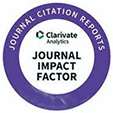A STUDY ON INTERACTION OF Cd(II) AND DIATOMACEOUS EARTH IN ADSORPTION PROCESS
Nuryono Nuryono(1*), Suyanta Suyanta(2)
(1) Chemistry Department, Faculty of Mathematics and Natural Sciences, Universitas Gadjah Mada, Yogyakarta
(2) Chemistry Department, Faculty of Mathematics and Natural Sciences, Universitas Gadjah Mada, Yogyakarta
(*) Corresponding Author
Abstract
In this research, interaction occurring in adsorption process between Cd(II) and active site of diatomaceous earth has been studied. The study was carried out by evaluating Cd(II) adsorption on diatomaceous earth at various pHs, either for the earths without treatment, those after being heated or those treated with sulfuric acid and hydrogen chloride. Adsorption was performed by mixing diatomaceous earth, without and with treatments, and Cd(II) solution for one hour at various pHs (2 - 7), and un-adsorbed metallic ion was analyzed by atomic absorption spectroscopy (AAS). The treatments of diatomaceous earth included heating at temperatures of 300, 500, and 900oC for four hours, treatments with acids (3, 8, and 12 M of H2SO4, and 3, 15, and 18 M of HCl solutions for two hours at 150-200oC). Results showed that the increasing of pH from 2.0 to 3.0 and from 6.0 to 7.0 inclined adsorption of Cd(II) from 13.2 to 23.3 mg/g and from 24.0 to 26.4 mg/g, respectively. At a pH range of 3.0 - 6.0 the adsorption slightly increase from 23.3 to 24.0 mg/g. Heating of diatomaceous earth higher than 500oC caused the adsorption capability to be independence of the pH of solution. On the other hand, treatments with acids (H2SO4 and HCl) caused adsorption capability increased significantly with the increase in pH from 3.0 to 6.0. Adsorption evaluation at the pH range investigated showed that adsorption of Cd(II) on diatomaceous earth may be through interaction between Cd2+ and functional groups of T-OH (T = Si/Al).
Keywords
Full Text:
Full Text PdfReferences
[1] Hutabarat, S. and Evans, SM., 1986, Pengantar Oseanografi, UI Press, Jakarta
[2] Kaim, W., and Schwederski, B., 1994, Bioinorganic Chemistry: Inorganic Elements in the Chemistry of Life, John Wiley and Sons Inc., New York.
[3] Mahdian, 1997, Studi tentang Adsorpsi Desorpsi Ni(II), Co(II), dan Mn(II) dalam Medium Air pada Adsorben Tanah Diatomeae Sangiran Sragen, Jawa Tengah, Tesis S-2, Pascasarjana, UGM. Yogyakarta
[4] Barron, J.A., 1987, Diatomite: Enviromental and Geologic Factors Affecting Its Distribution, dalam J.R. Hein (edt.), Siliceous Sedi- mentaJy Rock-Hosted Ores and Petroleum, Van Nostrand Reindhold, New York.
[5] Priatna, K., Nugraha, Y., and Rukiah, 1990, Bulletin PPTM, 12, 7-22
[6] Purwanto A., 1998, Impregnasi 2-Merkaptobenzotiazol pada Tanah iatomeae dan Pemanfaatannya sebagai Adsorben Raksa(II) dalam Medium Air, Tesis S-2, Pascasarjana, UGM. Yogyakarta.
[7] Nuryono, E.S. Kunarti, and Narsito, 2000, Jurnal Kimia Sains dan Aplikasi, III, 2, 41-51.
[8] Nuryono, Suyanta, dan Narsito, 2002, Jurnal MIPA, 25, 40-49.
[9] Nuryono, 2002, Berkala Ilmiah MIPA, 3(XII), K10-K24.
[10] Nuryono, 2002, Kajian Adsorpsi Cd(II) Pada Tanah Diatomit Hasil Perlakuan dengan Natrium Etilendiamintetraasetat (Na2EDTA), Seminar Nasional MIPA FMIPA UNY, 26 Oktober 2002 di Yogyakarta.
[11] Sperling, M., Xu, SX., and Welz, B., 1992, Anal. Chem., 64, 3101.
[12] Fukushima, M., Nakayasu, K., Tanaka, S., and Nakamura, H., 1995, Anal. Chim. Acta, 317, 195-206.
[13] Nuryono, Purwanti, R., and Suyanta, 2003, Kajian Pengaruh pH terhadap Adsorpsi Cr(III) pada Adsorben Tanah Diatomit, Seminar Nasional Kimia Jurusan Kimia FMIPA UNNES, 28 September 2003 di Semarang.
[14] Tremilton, B., 1993, Electrochimie Analitique et Reactions en Solution, Masson, Paris.
[15] Zachara, MJ., Aisworth, CC., Cowan, EC., and Schmidt, LR., 1990, J. Envir. Sci. Tech., 24, 118-126
[16] Morel, FMM., and Hering, JG., 1993, Principles and Applications of Aquatic Chemistry, John Wiley & Sons, New York.
[17] Nuryono and Suyanta, 2002, Pengaruh Perlakuan Tanah Diatomit dengan HCl dan H2SO4 Terhadap Pelarutan Na, Ca, Mg, Fe, Si, dan Al, Proseding Seminar Nasional Kimia XI, Jurusan Kimia FMIPA UGM, Yogyakarta
Article Metrics
Copyright (c) 2010 Indonesian Journal of Chemistry

This work is licensed under a Creative Commons Attribution-NonCommercial-NoDerivatives 4.0 International License.
Indonesian Journal of Chemistry (ISSN 1411-9420 /e-ISSN 2460-1578) - Chemistry Department, Universitas Gadjah Mada, Indonesia.












